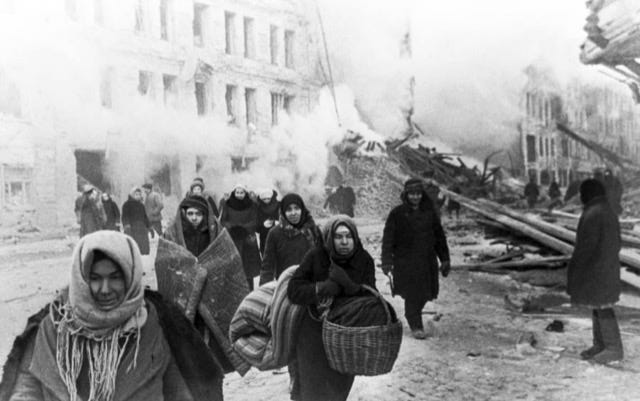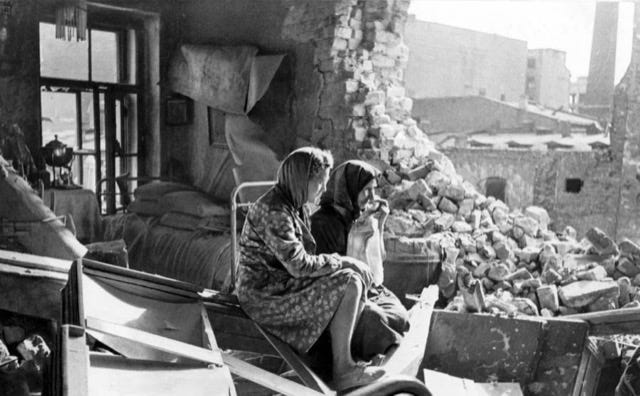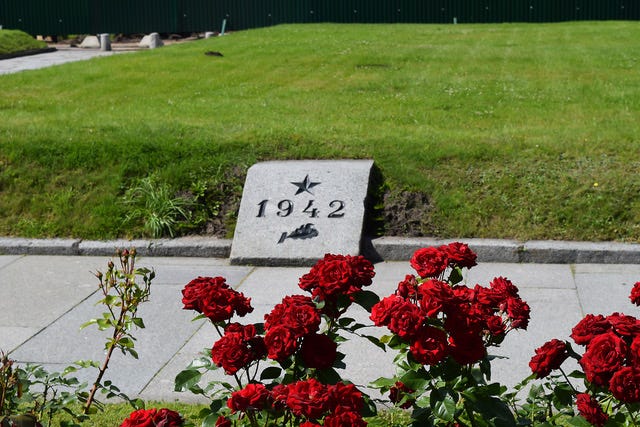"They were counted. That was all."
Issue #8 Diary Notes of a European Journey (Mainly about Russia) May 25 -June 1, 1962
In the fall of 1941, just weeks before the United States entered World War II, Nazi Germany invaded Russia. The Soviet city of Leningrad (now Saint Petersburg) and the surrounding region was blockaded for 872 days. The result was brutal. The number of civilians who died from starvation, cold, and bombing (within the blockaded territory or immediately following evacuation from it) is estimated to be 900,000. In recent years historians have referred to the siege as genocide, putting this cataclysm second in severity only to the Holocaust itself, both perpetrated by Nazi Germany.
Playwright and humanitarian activist Paul Green visited Leningrad sixty years ago this month. He wrote in detail in his diary about his tour there in the late spring of 1962. In the last entry we shared the first part of his tour, conducted by a young guide named Nina. Green’s narrative continues, eerily echoing images of present-day Ukraine following the Russian invasion. Green also hears concerns at the dinner table about Taiwan’s independence from China.

Wednesday, May 30, 1962.
Mile after mile we drove in silence. Nina sat looking ahead of her, at what I didn’t know, maybe nothing…
Back in town Nina went her way and the driver his. I went to the big bookstore on the corner in front of the Kazan Cathedral. Found some English translations of Communist documents. Bought several, one being N. Khrushchev’s report “On The Communist Program” delivered to the 22 Congress of the party October 18, 1961, a document of some 38-40 thousand words.
Wrote a few letters and then to dinner. Met an English woman of some 40 or 50, at the table where the hostess put me. She was very intelligent. We had a good chance to talk and she didn’t mind doing it. I never did ask her name nor she mine. After a few gives and takes I found she was a teacher of English in China and was then on her way back to Peiping [Peking] after a holiday in England.
“I was born in China, was brought up there,” she said, “and in an hour I am taking the train back to my work. Things are happening there, yes, things are happening.” And her face was alive and enthusiastic. (Poor young Nina!
The waiter brought our food and we talked as we ate. I was anxious to get as much information from her as a I could in the short meeting. So I prompted her along every chance I got.
“The program is working out there then?” I asked.
“Oh, yes, it is. The country is being re-made. The old days of human exploitation are ended. The war lords, the gamblers and crooked landlords are gone.”
“Killed? Executed?” I asked.
“No, no.” Her face grew serious. “True at the beginning of things there was much opposition to the new order—opposition from the corrupted ones. Many of them had to be got out of the way. Executed, yes. There was no other way. They wouldn’t change, wouldn’t see the need for the new day. So, perish they must. But that doesn’t happen now. I know. As I say, I’ve been brought up there, witnessed it all. And now there is a new life, a new vision among the people. The future is theirs. There is great interest in the English language, for the majority of the scientific works of the world have been written in English, and the young people are interested in science there, as they are here in Russian. Through science the world is to be re-made.”
“And the feeling toward to West? Toward the United States?”
“Better in some places, yes. They cannot understand why your country tries to keep up the mockery of a nationalist China on Formosa. They consider Chiang a crook. They consider, too, that Taiwan, Formosa, is their land, and some day, somehow they will get it back.”
“By war?”
“No, no. They all are against war. They realize the absurdity of war in this —er—nuclear age. But they think the U.S. will come to its senses. Excuse me, I am not saying that. They are.”
We ate a while.
“In my country,” I finally went on, “there is talk in the newspapers of possible, maybe actual friction between Russia and China.”
“Is it hoped that there will be?” And she looked at me sharply, a piece of bread held speared on her fork.
“Yes and no,” I answered.
“Russia and China are working in the utmost cordiality right now.” The bread went into her mouth and her fork and knife went to work on the piece of meat on her plate. She chewed a bit, swallowed and hurried on. “They are building great industrial works together, at least side by side there in the border region, Russian engineers and technicians helping the Chinese and vice versa.”
…And so we talked on a bit more—from her some additional comments: Japan needs to talk freely with China. There is a great market there. China will develop nuclear power in time, but now is too busy with agriculture, roads, schools, industry, health, consumer goods…Etc.
A sort of battle-ax elderly American woman came in to tell the teacher goodbye—weathered face, whiskey voice, iron grey hair, a crafty, knowledgeable hawk eye. After the Englishwoman had gone, Mrs. Hawkeye sat down at my table and began to talk.
“A wonderful woman, that,” she said, jerking her smoke-plumed cigarette in the direction of the departing figure. “In half an hour she is taking the train for Peiping—seven days and nights she’ll ride, on across Siberia—hard ride, sleeping hard, she rides second class. I met her on the boat from England.” She sucked on her cigarette and blew a blast of milk-pale smoke before her. “I’m a school teacher from Los Angeles, been teaching school over 30 years. I’m taking time off going about the world seeing things, seeing people.”
I told her I was a school teacher, too, off and on. We chatted a bit about Los Angeles and Santa Monica…
She rose, holding a paper bag aloft in her free hand. “I’ve got to catch a train in a few minutes for Moscow. I’ve got my supper in here. There’s no dinner on that train. Goodbye.”
She started off, then turned back. “It’s these mad and crazy wars that ruin everything, isn’t it?”
“Yes, yes.”
“I hope we’re done with them. I hope so.” She shook her head. “But it looks threatening, it does. Oh, these crazy leaders.”
“We must all work hard for peace and friendship!”
“We must. We must.”
Thursday, May 31, 1962
Up at 8. Finally got breakfast, wrote a few cards and letters, read as best I could a communist paper…After lunch I asked Nina to take me to the cemetery where those who had perished in the siege (of September 1941) lay buried.
I was not prepared for what I saw.
We drove for several miles and finally came to a wide entrance to a sort of flat field. The entrance commanded the field, which was on a lower level. A wide path led across the expanse to a distant huge bronze figure of a a woman mourning her dead. And behind her a stretching high wall.
We went inside one of the entrance buildings. There in front of me were the figures and words which said that 632,253 people had perished and were buried in this nameless earth. There were photographs of scenes during the siege. People lying dead in the snow, starved, frozen. A few pictures of starving little children — a copied page from a child’s diary, a child nine years old with its brief entries — such as, “On May 21 my little brother died. On May 26 my mother died. June 2 Daddy died. Aug. 3 sister died.” Then there was an entry by another hand which said on such and such a date the little girl died.
Well, there were only a few photographs. These people make no sentimental display of their sorrows and wounds. But so pitiful were these few that before I knew it tears were pouring out of my eyes. Nina looked at me with a bit of astonishment and I walked off to the side until I got in shape.
We walked down the long path, the metal flower wreaths on either side honoring the mute flat earth. To my questions Nina said —
“You must realize that our people were so weak from starvation that many them lay down in the streets and died, they would die sitting at their lathes or their work. The dead were gathered in piles and trucks would come to get the bodies. They were loaded on in great numbers. We were so poor in clothing that in the cold weather they were stripped and buried so.” She spoke, as always, simply, factually. “Many were teachers, professors, doctors, lawyers, men of once high standing, mothers, sisters, children—all no more than numbers. They were counted. That was all.”
“They were brought out here a great distance.”
“Yes, our people were too weak to dig graves. So great trenches were opened up by dynamite or explosives. The trucks would back up to them—“
“You don’t mean they would dump them in?”
“Yes, just, er, dump them in. No names, no clothes, though sometimes friends or loved ones would wrap a sheet around a body. Then the machines—the —“
“Bulldozers?”
“—would cover them—they’re here—these hundreds of thousands with no names.”
We walked on. I was groaning deep inside. But I got the better of my woman’s water drops.
We came to the figure mounted up on the slight elevation and looked a the inscription on the wall behind. Together we got out a sort of translation. I was surprised to find that though Nina spoke excellent English, when it came to turning the Russian language into English she had difficulty. The inscription ran something like this:
“Here lie citizens of Leningrad—men, women, children and beside them are soldiers. They sacrificed their lives for thee, Leningrad, the cradle of the great October revolution. We cannot mention (tell) their noble names because there are so many of them under the protection of this eternal granite. But you who look at this monument know that not one is forgotten and nothing is forgotten. The enemy clad in armor and steel were pushing their way into the city. But along with the soldiers, the teachers, the workers, the children defended it and they declared that death should fear them but they should not fear death. The hungry, dark and severe winter of 1941-42 is not forgotten. The terrible bombing and assaulting of 1943 is not forgotten. The entire city is filled with destruction. Not one of your lives, dear comrades, is forgotten. Under the continuous bombardment from the sky, from the earth and from the water you performed heroic deeds. And you did simply and with honor. And together with the whole country all of you have won the victory and let the banners be furled in honor of your immortal life.”
How this city suffered!
Back to hotel. Went to bookstore, bought a volume of English stories. Supper alone.
Correction: I learned today there actually are a number of churches open and in use in Leningrad:
15 Russian Orthodox
1 Catholic
1 Synagogue
1 Moslem
Eighteen in all. It is easy to miss the facts.
Friday, June 1, 1962
Nina and driver came at eleven. Sheets of rain pouring down outside. We set out anyway. Went to the Cathedral of Peter and Paul. Fine wood carvings gilded over. Tombs of Peter the Great, Catherine the Great, etc. about the cathedral, raised marble sarcophagi, bodies beneath, all simple and all the same.
She told me of the earlier revolution, how five of the nobility, leaders in that rebellion, were brought from the prison just before to their execution and had their funerals preached here. Crowd of the faithful around. After a lot of praying and singing by the priests, “they were taken out and hanged there.” She pointed off toward the outdoors. Outside the courtyard flooded, rain pouring. We half sided to the car, and the driver took us toward the prison close by. As we went through the entrance way Nina told me to notice the walls. “23 meters thick,” she said.
The driver pushed his little Volga car (by the way, a stout machine, a bit larger than a lark and solidly built) on toward the prison gateway—mud and water. Finally gave up and backed out. Nina told him to wait. We got out and stepped and hopped along a path by a long wall and finally got to the ticket taker’s door. We went inside. Along a corridor we went, passing cell after cell, each door open, all empty now. The suffering and the tragedies of the years ago now past.






